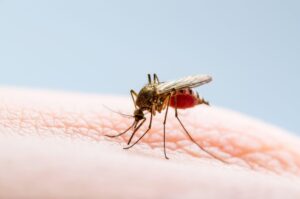Last updated on September 26th, 2024 at 11:15 am
Malaria treatment represents a multidimensional challenge in the realm of global health, a challenge that has persisted for centuries. This mosquito-borne disease, caused by the Plasmodium parasite, continues to take a heavy toll on humanity, particularly in regions where it is endemic.
Malaria is transmitted to humans through the bite of infected mosquitoes called Anopheles mosquitoes. Despite substantial progress in recent years, malaria remains a major cause of illness and death, particularly in tropical and subtropical regions.
Malaria Symptoms
Malaria manifests with a range of symptoms that can vary in severity. The presentation of symptoms depends on factors such as the specific Plasmodium species responsible for the infection, the individual’s immune response, and the presence of any underlying health conditions. Common malaria symptoms include:
Fever: A high fever is one of the hallmark symptoms of malaria. It often follows a cyclical pattern, with chills and shivering during the fever episodes.
Chills and Sweats: Patients with malaria often experience intense cold chills, followed by profuse sweating during fever episodes.
Headache: Persistent headaches are a common symptom, and they can range from mild to severe.
Muscle and Joint Pain: Many individuals with malaria report muscle and joint pain, which can be quite debilitating.
Fatigue: Malaria can cause profound fatigue and weakness, often lasting for an extended period.
Nausea and Vomiting: Nausea and vomiting are common gastrointestinal symptoms associated with malaria.
Anemia: Severe malaria can lead to anemia due to the destruction of red blood cells by the parasite. Anemia may result in pale skin and fatigue.
Enlarged Spleen and Liver: In some cases, the spleen and liver may become enlarged, leading to abdominal discomfort.
Cerebral Malaria: In severe cases, particularly with P. falciparum infections, cerebral malaria can occur. This condition can lead to seizures, impaired consciousness, and coma.
Read: What are Generic Medicines?
Malaria Treatment
A range of effective treatments for malaria exists. Let’s explore the various options available for malaria treatment, focusing on the drugs and strategies that healthcare providers use to save lives and mitigate the impact of this deadly infection.

Malaria Treatment Drugs
Antimalarial drugs are the cornerstone of malaria treatment. They work by targeting and eliminating the Plasmodium parasites responsible for the disease. The choice of malaria treatment drugs depends on several factors, including the specific Plasmodium species causing the infection, the severity of the illness, and the patient’s age and overall health. Here are some key antimalarial drugs:
- Artemisinin-Based Combination Therapies (ACTs): ACTs are the most widely used and effective treatment for uncomplicated malaria, particularly for Plasmodium falciparum infections. They combine an artemisinin derivative (such as artemether or artesunate) with another antimalarial drug (usually a partner drug like lumefantrine or mefloquine). ACTs are known for their rapid parasite clearance and reduced risk of drug resistance.
- Chloroquine: Although resistance to chloroquine has become prevalent in many regions, it is still used to treat some forms of malaria, such as chloroquine-sensitive P. vivax and P. ovale infections. Chloroquine is typically taken as a tablet or syrup.
- Primaquine: Primaquine is used to treat P. vivax and P. ovale infections. It is unique in its ability to target the dormant liver forms of the parasite (hypnozoites) and prevent relapses.
- Quinine and Quinidine: These drugs are used in cases of severe malaria when the patient cannot tolerate oral medications. They are administered intravenously and have a role in treating life-threatening malaria.
- Atovaquone-Proguanil (Malarone): This combination drug is used for both the prevention and treatment of malaria. It is effective against P. falciparum and P. vivax but is less commonly used due to cost and potential side effects.
> Consult a doctor and Order Medicine Online
Malaria Treatment Drugs Resistance
To combat the emergence of drug resistance, combination therapies like ACTs are preferred over single-drug treatments. This strategy involves using two or more drugs with different mechanisms of action. By attacking the parasite in multiple ways, combination therapies reduce the likelihood of resistance development and increase treatment effectiveness.
However, malaria treatment drug resistance remains a significant concern in some regions, particularly for artemisinin-based drugs. Ongoing research and surveillance efforts are essential to monitor resistance patterns and adjust treatment strategies accordingly.
Conclusion:
Malaria treatment has evolved significantly over the years, with the development of effective antimalarial drugs and improved diagnostic tools. The choice of treatment depends on the specific circumstances of each case, such as the Plasmodium species involved, the patient’s condition, and the availability of drugs.
Early diagnosis and prompt treatment remain critical in saving lives and reducing the global burden of malaria. Continued research and collaborative efforts are vital to stay ahead of drug resistance and work towards a future where malaria is a rare and treatable disease.
FAQs on Malaria Treatment
Q.1 What is Malaria treatment?
Malaria treatment involves the use of antimalarial drugs to eliminate the Plasmodium parasites causing the disease, along with supportive care to manage symptoms and complications. Early diagnosis and appropriate treatment are essential for a successful outcome in malaria cases.
Q.2 Are there specific drugs for treating different types of malaria?
Yes, the choice of antimalarial drug depends on the Plasmodium species causing the infection, with different drugs used for P. falciparum, P. vivax, and other species.
Q.3 Can you treat malaria at home?
In some cases of uncomplicated malaria, antimalarial medications may be prescribed for home treatment, but severe cases require hospitalization.
Q.4 Is drug resistance a concern in malaria treatment?
Yes, drug resistance, particularly against artemisinin-based drugs, is a significant challenge in malaria treatment, necessitating ongoing research and surveillance efforts.
Related Links:
